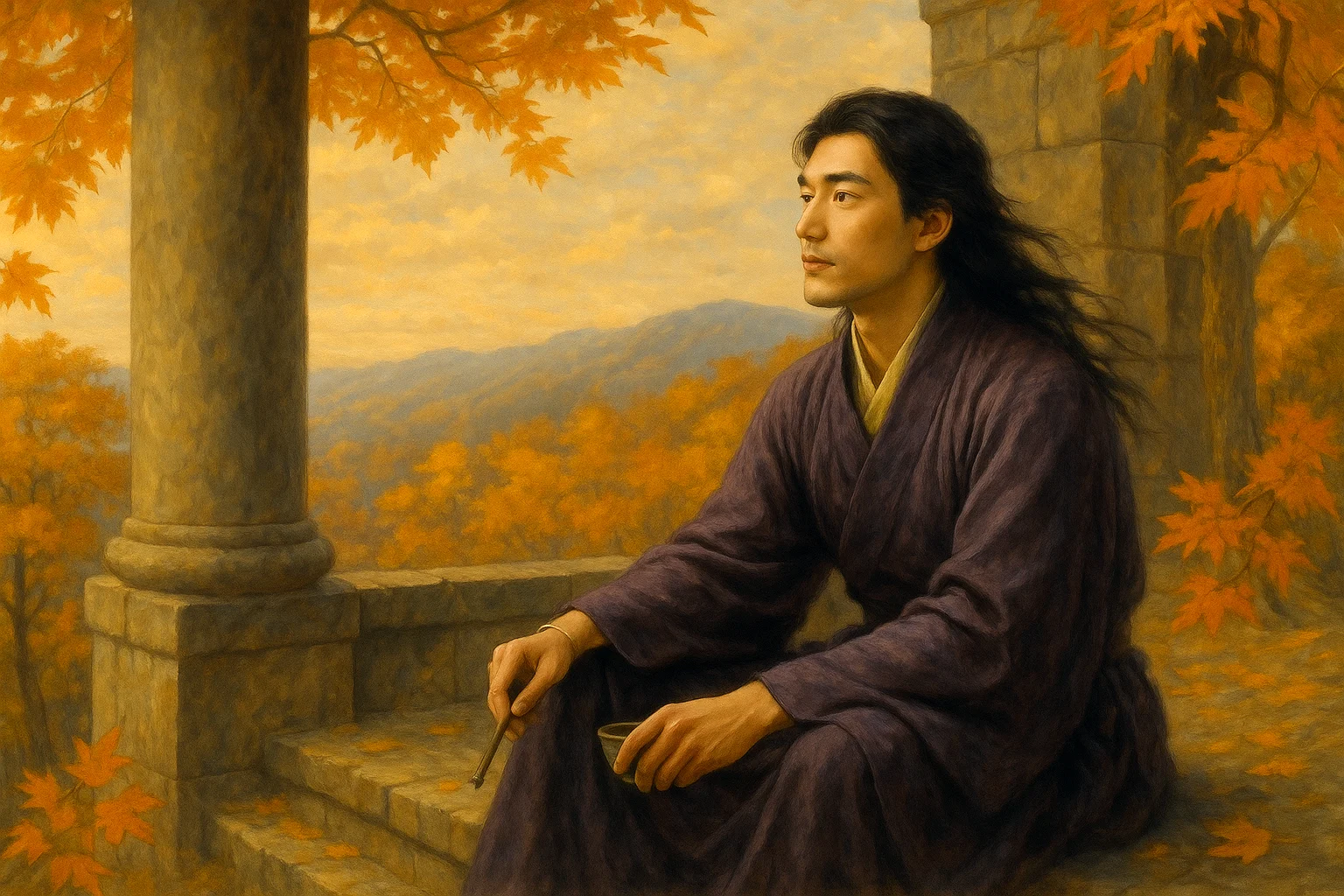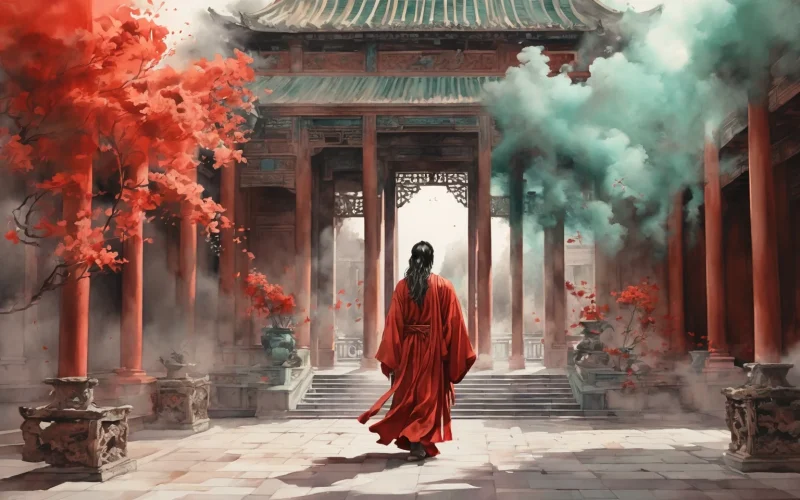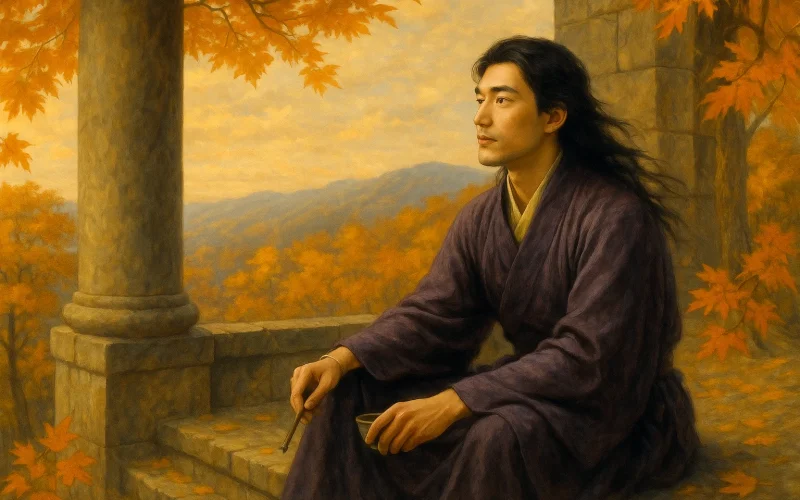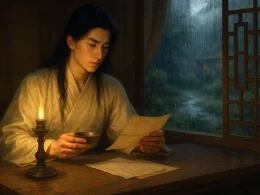With jade pendants chiming, through Western Bureau you stride,
At Phoenix Hall’s steps, feathered banners flank your side.
Auspicious mists swirl round blue-jade desks in flight,
Sun-glaze climbs distant on crimson-frost robes bright.
Among blossoms, cloud-banners blaze united,
Beyond birds, dew-drenched palms rise clear-sighted.
Would you recall, midst ten-thousand-year blooms,
One leaf adrift in windswept broom-glooms?
Original Poem
「朝下寄韩舍人」
耿玮
侍臣鸣珮出西曹,鸾殿分阶翊彩旄。
瑞气迥浮青玉案,日华遥上赤霜袍。
花间焰焰云旗合,鸟外亭亭露掌高。
肯念万年芳树里,随风一叶在蓬蒿。
Interpretation
This poem was composed during the Dali era (766–779 CE) of Emperor Daizong of Tang. Geng Wei, once an early-career military advisor, later faced political disillusionment, and his works often reflect themes of displacement and humility. Here, he writes to Han Sheren (a high-ranking official in charge of imperial edicts and ceremonies) after a court assembly. Through vivid depictions of Han's grandeur, Geng contrasts his own marginalized status, blending reverence with quiet self-pity.
First Couplet: "侍臣鸣珮出西曹,鸾殿分阶翊彩旄。"
Shì chén míng pèi chū xī cáo, luán diàn fēn jiē yì cǎi máo.
Attendants' jade pendants chime as they exit the Western Office;
By Phoenix Hall, ranks part to flank the feathered banners' glory.
This couplet establishes ceremonial grandeur. "Jade pendants chime" captures the auditory elegance of court ritual, while "feathered banners" visualize imperial authority. The parallel structure (exit/part, Western Office/Phoenix Hall) mirrors the disciplined choreography of power.
Second Couplet: "瑞气迥浮青玉案,日华遥上赤霜袍。"
Ruì qì jiǒng fú qīng yù àn, rì huá yáo shàng chì shuāng páo.
Auspicious mists hover above jade-green desks afar;
Dawn's glow climbs his crimson robe embroidered with frost-fire.
Here, the sacred and secular merge. "Auspicious mists" (瑞气) sanctify the bureaucratic space ("jade desks"), while "frost-fire robe" (赤霜袍) embodies the official's paradoxical role: both icy authority and warm humanity, illuminated by the rising sun—a metaphor for imperial favor.
Third Couplet: "花间焰焰云旗合,鸟外亭亭露掌高。"
Huā jiān yàn yàn yún qí hé, niǎo wài tíng tíng lù zhǎng gāo.
Among blossoms, cloud-painted banners blaze like gathered flames;
Beyond birds, dew-kissed hands rise tall—officials poised in dawn.
This couplet contrasts vibrant motion ("blazing banners") with statuesque dignity ("dew-kissed hands"). The "cloud banners" (云旗) symbolize celestial mandate, while "hands raised in dawn" (露掌高) suggest both reverence and vulnerability—their dew implying transience despite lofty positions.
Fourth Couplet: "肯念万年芳树里,随风一叶在蓬蒿。"
Kěn niàn wàn nián fāng shù lǐ, suí fēng yī yè zài péng hāo.
Might you recall, within the eternal fragrant grove,
lone leaf adrift in wind, lost among coarse weeds?
The closing juxtaposes permanence ("eternal grove" as the court) and fragility ("lone leaf" as the poet). The rhetorical question "Might you recall…" (肯念) balances hope against despair. "Coarse weeds" (蓬蒿), associated with wilderness, amplify the speaker's exile from cultivated power.
Holistic Appreciation
The poem employs a structure that transitions from grandeur to desolation. The first three couplets vividly depict the resplendent ceremonial return of Imperial Secretary Han, using opulent and dignified language to paint a majestic scene. Yet the final couplet abruptly shifts to barren wilderness, contrasting the court's pomp with the poet's own existence—a lone "leaf among weeds," adrift and insignificant. This stark juxtaposition renders the closing lines profoundly poignant.
Within the poet's reverence for his friend lingers a deep self-pity, though never expressed as resentment. Instead, it manifests as a subtle plea for understanding, a faint cry from one lingering at politics' margins. This technique—"concealing emotion within scenery, revealing humility beneath honor"—epitomizes Geng Wei's poetic style, where classical elegance intertwines with melancholic introspection.
Artistic Merits
The poem's most striking feature is its emotional transference through imagery and contrast. The first three couplets, grand and ornate yet meticulously crafted, build momentum with their depiction of imperial solemnity, while the finale delivers a natural, heartfelt turn—understated yet deeply moving. The regulated verse form shines through in its impeccable parallelism and harmonious rhythm, achieving both structural precision and emotional depth without descending into artifice.
Moreover, symbolic motifs like the "ten-thousand-year fragrant tree" and "a leaf among weeds" are rich in allegorical resonance, showcasing the poet's mastery of literary allusion and Neo-Confucian self-reflection.
Insights
This poem reminds us that even within the rigid hierarchies of ancient society, scholars of humble station could preserve their inner dignity and loyalty. The poet elevates his modest position through grand sentiment, using the image of a solitary leaf to suggest that though small, his spirit remains vast. Such expression teaches us that in adversity, one might anchor themselves in refinement and character, retaining an unbroken sense of self.
About the poet

Geng Wei (耿湋, dates unknown), a Tang dynasty poet from Yongji, Shanxi, was among the "Ten Great Talents of the Dali Era." Renowned for his mastery of five-character regulated verse, his poetry is distinguished by its economical diction and tranquil imagery. While the prevailing style of Dali poetry tended toward austerity and desolation, Geng Wei developed a distinctive voice marked by understated naturalism.










